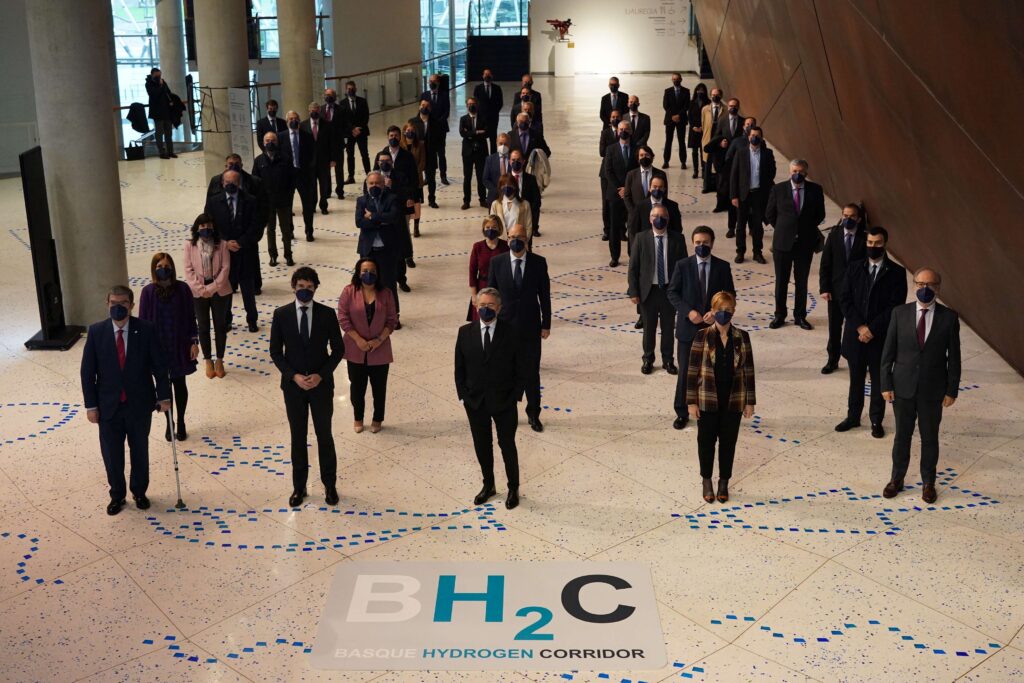by Xabier Aja
The Basque Country is characterized by a highly qualified industrial network in the energy sector, especially in clean renewable energies. The Basque Country is home to leading companies in the sector with a wide presence in international markets such as Iberdrola, Siemens-Gamesa, Sener and Ingeteam, as well as other important business groups like Petronor, a company partially owned by Repsol. The existence of this industrial and technological base supports the strong commitment that the Basque Country will make in developing green hydrogen as a fuel for the future in the decarbonizing process and effort to reduce CO2 emissions in the atmosphere.
In this sense, the collaboration of the public and private sectors in the Basque Country has made its commitment to green hydrogen official with the launch of the project called Basque Hydrogen Corridor (BH2C) that brings 78 organizations together for the initiative, including companies, institutions and technology centers. Let’s keep in mind that green hydrogen is a key element in the process of energy transition towards a world with less greenhouse gas emissions into the earth’s atmosphere, as well as towards sustainable development.
The production of green hydrogen is mainly carried out through electrolysis, a process that dissociates the molecule from water, the famous H2O, separating hydrogen from oxygen by means of electricity, an electrical energy produced through renewable sources such as wind or solar. The use of this fuel will make it possible to meet the future energy demand of industry, transportation or the residential sector.
The Basque Hydrogen Corridor project, an initiative originally promoted by the company Petronor, is planning on the construction of three green hydrogen generation facilities in the Basque Country in the coming months. The first, with 2 MW power, will be operational in 2022 to supply a new Basque technology park, of the town of Abanto, in the province of Bizkaia. Other partners such as Enagas and the Basque Energy Agency (EVE) will participate in a second plant, with 10 MW, to be installed in the port of Bilbao in 2024. Finally, in 2025 there are plans for building a third plant with a 100 MW electrolyzer.

Initially, these initiatives include investments in the Basque Country amounting to at least 1.3 billion euros between 2021-2026 and will create some 1,340 jobs. As a result of the planned investments, the objective is to produce 20,000 tons of hydrogen per year and its use as an energy vector would reduce CO2 emissions into the air by about 1.5 million tons per year.
Another large Basque company, Iberdrola, has reached an agreement with the US company Cummins to develop large electrolyzers in order to supply 500 MW by 2023. This project includes an investment of around 50 million euros and the creation of some 350 jobs.
In addition, Iberdrola will deploy in the Basque Country a hydrogen refueling network for heavy transport vehicles (trucks, buses, vans, etc.) thanks to an alliance with the Basque Government and the governments of the provinces of Araba, Bizkaia and Gipuzkoa, together with the ports of Bilbao and Pasaia (in Gipuzkoa), and a large group of companies, including potential customers and suppliers. This investment will reach 37 million euros.

The H2 filling stations, known as “hidrogeneras” will be powered by photovoltaic solar plants and installed adjoined to the service stations. To generate green hydrogen this project will build 10 electrolyzers with a global capacity of 10 MW, capable of producing 4,000 kilograms of green hydrogen per day. In addition, there will also be smart batteries to store surplus electricity not consumed in the process.
All these business initiatives, with more than 1.4 billion euros of joint investment, are an example of the important technological and industrial commitment that the Basque Country is making to promote green hydrogen as a fuel for the future. One of the objectives, in addition to promoting its use, is to reduce the costs of producing hydrogen from renewable sources which, currently in Europe, is between two and four times more expensive than those generated by natural gas.
The strategy that the Basque Government is driving in this area calculates that by 2030 the production level of installed electrolyzation in the Basque Country will reach a capacity of 300 MW, so that 100% of the hydrogen produced in the territory will be generated by renewable energies. The implementation of green hydrogen will allow a double objective. On the one hand, to make the massive integration of renewable electricity generation possible, whether from wind farms or photovoltaic solar farms; and, on the other, to advance in the process of decarbonization of economic activities, in line with the European Union’s sustainable development strategies.
With these initiatives, the Basque Country hopes to become an industrial and technological hub of reference in Europe in the development of technologies for the production and use of green hydrogen in the coming years.


Be the first to comment on "The Basque Country is Committed to Green Hydrogen"